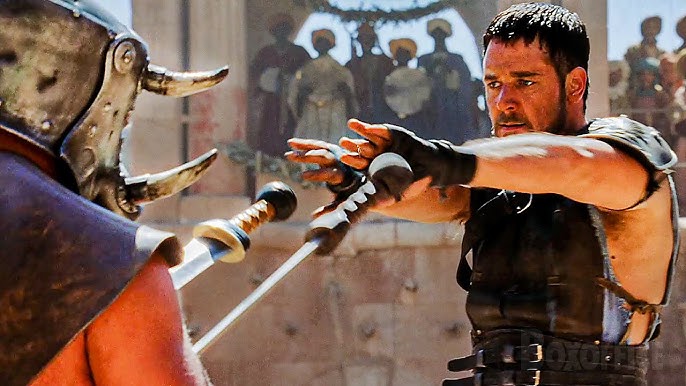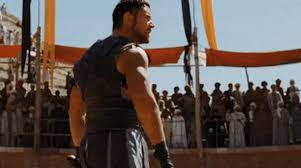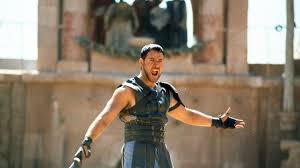🎬 Gladiator (2000)

Gladiator (2000) Review: A Timeless Epic of Honor, Power, and Revenge
Ridley Scott’s Gladiator (2000) is a cinematic masterpiece that redefined the historical epic for the modern age. With its sweeping scale, unforgettable performances, and a story that seamlessly intertwines personal revenge with political intrigue, the film has etched itself into the annals of cinema history. Winning five Academy Awards, including Best Picture, Gladiator remains a landmark film that continues to captivate audiences worldwide.
Plot Overview: Betrayal and Redemption
Set in the twilight of the Roman Empire, Gladiator follows the tragic journey of Maximus Decimus Meridius (Russell Crowe), a decorated general who is betrayed by Commodus (Joaquin Phoenix), the power-hungry son of Emperor Marcus Aurelius. After being enslaved and presumed dead, Maximus rises through the ranks of gladiatorial combat, fueled by his desire for vengeance and justice. His journey is one of resilience, loyalty, and honor as he seeks to avenge the murder of his family and restore the legacy of the late emperor.
Russell Crowe: A Career-Defining Performance
Russell Crowe’s portrayal of Maximus is nothing short of iconic. He embodies the character’s stoic determination and emotional depth with remarkable skill. From his commanding presence on the battlefield to the quiet grief for his lost family, Crowe captures the essence of a man torn between duty and vengeance. His memorable line, “Are you not entertained?” has become a cultural touchstone, symbolizing both the spectacle of the gladiator arena and the human cost of such entertainment.
Joaquin Phoenix: A Villain for the Ages
As Commodus, Joaquin Phoenix delivers a chilling performance that balances vulnerability with ruthless ambition. Commodus is not a one-dimensional villain; his desperate need for approval and love adds layers to his character. Phoenix masterfully portrays this complexity, making Commodus one of the most memorable antagonists in film history. His manipulative schemes and unbridled cruelty serve as a stark contrast to Maximus’s integrity and honor.
Ridley Scott’s Vision: A Modern Epic
Ridley Scott’s direction elevates Gladiator to a level of grandeur reminiscent of classic epics like Ben-Hur and Spartacus. The film’s visual style is a feast for the senses, with meticulously designed sets, breathtaking cinematography, and seamless integration of CGI. Scott’s attention to detail brings ancient Rome to life, immersing viewers in its splendor and brutality.
Key Visual Elements:
- The Colosseum: The iconic arena is recreated with astonishing realism, serving as the stage for some of the film’s most thrilling moments.
- Battle Sequences: The opening battle in Germania is a masterclass in cinematic warfare, blending chaos with artistry.
- Costume Design: The intricate armor, flowing togas, and gladiatorial gear reflect the period’s authenticity.
Themes: Power, Loyalty, and Legacy
Gladiator delves deep into universal themes that resonate across cultures and eras. At its core, the film is about the corrupting influence of power and the enduring strength of loyalty. Maximus’s unwavering commitment to his fallen emperor’s vision contrasts sharply with Commodus’s self-serving ambition, highlighting the moral divide between the two characters.
Exploration of Legacy:
Maximus’s journey is not just about personal revenge but also about preserving the values of honor and justice that Marcus Aurelius sought to instill in Rome. His selflessness and determination to fight for a cause greater than himself elevate his character to mythic proportions.
The Music: Hans Zimmer’s Masterpiece
Hans Zimmer’s score for Gladiator is as iconic as the film itself. The hauntingly beautiful “Now We Are Free,” performed by Lisa Gerrard, evokes a sense of loss and hope that perfectly complements Maximus’s journey. Zimmer’s use of orchestral arrangements and choral elements adds an emotional depth that enhances the film’s epic scale.
Key Moments That Define Gladiator
- Maximus’s Betrayal: The devastating sequence where Maximus discovers the fate of his family is a turning point that fuels his quest for vengeance.
- The Colosseum Debut: Maximus’s tactical brilliance and combat skills shine as he leads his fellow gladiators to victory, earning the crowd’s adoration.
- The Final Duel: The emotionally charged confrontation between Maximus and Commodus encapsulates the film’s central conflict, delivering a satisfying and poignant resolution.
Why Gladiator Stands the Test of Time
- Timeless Storytelling: The themes of honor, betrayal, and redemption resonate universally, ensuring the film’s relevance across generations.
- Unforgettable Characters: The dynamic between Maximus and Commodus drives the narrative, offering compelling performances that anchor the film.
- Technical Brilliance: From its stunning visuals to its evocative score, every element of Gladiator showcases the artistry of filmmaking at its finest.
Cultural Impact and Legacy
Since its release, Gladiator has left an indelible mark on popular culture. It revived interest in historical epics, inspiring a wave of similar films like Troy and 300. The movie’s quotes, characters, and imagery have permeated various forms of media, cementing its status as a cultural phenomenon.
Awards and Accolades:
- Academy Awards: Best Picture, Best Actor (Russell Crowe), Best Costume Design, Best Sound, Best Visual Effects.
- Golden Globes: Best Motion Picture – Drama, Best Original Score.

Fun Facts About Gladiator
- Historical Inaccuracies: While the film takes liberties with historical events, it captures the spirit of the Roman Empire, prioritizing emotional resonance over factual accuracy.
- Improvised Lines: Crowe’s famous line, “At my signal, unleash hell,” was improvised, showcasing his deep connection to the character.
- Oliver Reed’s Final Performance: Reed’s role as Proximo was completed using CGI after his untimely death during production.
Conclusion: A Cinematic Triumph
Gladiator is more than just a film; it’s an experience. With its powerful performances, masterful direction, and profound themes, it continues to captivate audiences and inspire filmmakers. Whether you’re drawn to its epic battles, emotional depth, or timeless story, Gladiator is a masterpiece that deserves its place in the pantheon of great films.